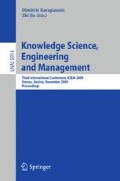Abstract
Separation logic has two spatial connectives ∗ and − ∗ . It is known that ∗ and − ∗ are not dual each other, like ‘and’ and ‘or’, ‘for all’ and ‘there exists’, ‘necessarily’ and ‘possibly’, etc. To define the dual connectives of ∗ and − ∗ there are two choices: one is to take ∗ and − ∗ as special logical connectives; another is to take ∗ and − ∗ as binary modalities. Correspondingly, the dual modalities of ∗ and − ∗ are represented as the dual connectives of ∗ and − ∗ , and as the dual modalities of ∗ and − ∗ , where the latter can be represented by unary modalities in the case that the formulas are defined in a special form.
Access this chapter
Tax calculation will be finalised at checkout
Purchases are for personal use only
Preview
Unable to display preview. Download preview PDF.
References
Brookes, S.D.: A semantics of concurrent separation logic. Theoretical Computer Science 375, 227–270 (2007)
Calcagno, C., Gardner, P., Hague, M.: From separation logic to first-order logic. In: Sassone, V. (ed.) FOSSACS 2005. LNCS, vol. 3441, pp. 395–409. Springer, Heidelberg (2005)
Calcagno, C., O’Hearn, P., Yang, H.: Local action and abstract separation logic. In: 22nd LICS, pp. 366–378 (2007)
Cardelli, L., Caires, L.: A spatial logic for concurrency. In: Kobayashi, N., Pierce, B.C. (eds.) TACS 2001. LNCS, vol. 2215, pp. 1–37. Springer, Heidelberg (2001)
Cardelli, L., Gordon, D.: Anytime, anywhere. modal logics for mobile ambients. In: 27th POPL (2000)
Chaochen, Z., Hoare, C.A.R., Ravn, A.P.: A calculus of durations. Inform. Proc. Letters 40, 269–276 (1991)
Hoare, C.A.R.: Communicating Sequential Processes. Prentice Hall, Englewood Cliffs (1985)
Hoare, T., O’Hearn, P.: Separation logic semantics for communicating processes. Electronic Notes in Theoretical Computer Science 212, 3–25 (2008)
Lozes, E.: Separation logic preserves the expressive power of classical logic (2004), http://www.diku.dk/topps/space2004/space.nal/etienne.pdf
O’Hearn, P.W.: Resources, concurrency and local reasoning. Theoretical Computer Science 375, 271–307 (2007)
Parkinson, M., Bierman, G.: Separation logic and abstraction. In: POPL 2005, pp. 12–14 (2005)
Reynolds, J.C.: Separation logic: a logic for shared mutable data structures. In: LICS, pp. 55–74. IEEE, Los Alamitos (2002)
Author information
Authors and Affiliations
Editor information
Editors and Affiliations
Rights and permissions
Copyright information
© 2009 Springer-Verlag Berlin Heidelberg
About this paper
Cite this paper
Shen, Y., Sui, Y., Wang, J. (2009). The Dual Spatial Connectives of Separation Logic. In: Karagiannis, D., Jin, Z. (eds) Knowledge Science, Engineering and Management. KSEM 2009. Lecture Notes in Computer Science(), vol 5914. Springer, Berlin, Heidelberg. https://doi.org/10.1007/978-3-642-10488-6_12
Download citation
DOI: https://doi.org/10.1007/978-3-642-10488-6_12
Publisher Name: Springer, Berlin, Heidelberg
Print ISBN: 978-3-642-10487-9
Online ISBN: 978-3-642-10488-6
eBook Packages: Computer ScienceComputer Science (R0)

